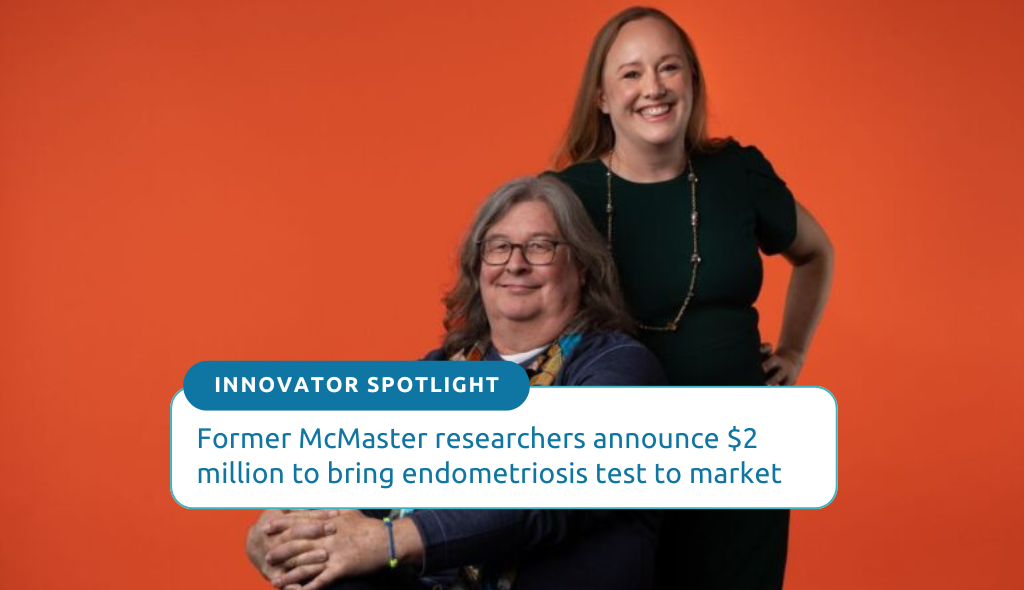Hamilton-based Afynia aims to improve the way endometriosis is diagnosed.
Led by two former McMaster University research scientists with experience in women’s health, Hamilton, Ontario’s Afynia Laboratories (formerly AIMA Labs) has set out to improve how endometriosis is diagnosed.
Afynia co-founder, president, and CEO Lauren Foster noted that from the onset of symptoms, women experiencing chronic pelvic pain often have to go through years of appointments and often-invasive tests to receive an endometriosis diagnosis. Research from the University of York pins the global average at nearly seven years.
“That, in this day and age, is completely unacceptable,” Foster told BetaKit in an exclusive interview. “There’s really no reason why they have to wait this long.”
Foster teamed up with Afynia co-founder and chief scientific officer Jocelyn Wessels to address this problem with the medtech startup’s patented, research-backed, microRNA-based molecular screening test, EndomiR, which is currently being used in several Canadian fertility clinics as part of its pilot market launch.
At the beginning of 2024, Afynia closed a $2-million CAD round of pre-seed funding to develop and begin bringing EndomiR to market. This previously unannounced round was backed by Capital Angel Network (CAN), SOSV, Gaingels, Aventura, and McMaster University’s Seed Fund.
Afynia’s pre-seed round consisted of a mixture of simple agreement for future equity (SAFE) funding and convertible notes, and marked the company’s first round of external capital beyond the $1 million in non-dilutive funding that Afynia has received to date.
The announcement comes as Afynia is gearing up to raise a larger, $3-million to $5-million USD seed round to fuel its efforts to commercialize EndomiR, Foster said.
Afynia’s mission to improve diagnostic accuracy and timelines for endometriosis
Foster noted she and Wessels bring “deep experience in women’s health” to the table, with numerous publications, patents, and copyrights. Foster was formerly a professor at McMaster University’s department of obstetrics and gynecology, while Wessels is a McMaster graduate who previously taught reproductive physiology, and worked as a postdoctoral fellow.
“The value in this cannot be overstated. Being able to tell patients that you do or do not have endometriosis is really important.”
Dr. Lauren Foster, Co-Founder and CEO of Afynia Laboratories
For folks suffering from the disease, this can be validating, Foster said. “Everyone that’s been telling you that it’s all in your head is wrong—you don’t just have to get used to this and learn how to live with it. There’s a real underlying problem and we can start to manage that more effectively than what we’ve been doing in the past.”
The same is true for very-low-risk individuals, as it can help determine another issue is to blame for someone’s symptoms and ensure patients are directed to the right doctors and treatment methods earlier. This can help patients, while also potentially cutting down excess billing in healthcare, Foster said.
From product validation to navigating regulatory compliance
According to Foster, there have been 18 to 20 different publications in the literature that have shown correlation between microRNA markers and endometriosis. “Unfortunately, one of the big problems is the lack of reproducibility across labs,” she noted.
Afynia’s founders took that into consideration, and Foster claimed they were able to reproduce results within their own lab. She said the startup also partnered with an undisclosed group in the US. They sent half of the samples to them and kept half, and the two labs independently ran the EndomiR test in different settings. The results they came out with varied by just three percent.
“That solidified for us that we were indeed on the right track and we were moving in the right direction,” said Foster, who noted that Afynia’s recent work has focused on tightening its endometriosis detection methods to ensure greater sensitivity and reproducibility.
Since then, Afynia has completed an additional study expanding its sample size out to 300 patients. The company is also participating in a grant-funded, Canadian Institutes of Health Research study of 1,000 patients alongside McMaster, which Foster expects will provide further clinical validity for EndomiR in comparison to diagnoses made on the basis of imaging or surgery.
Afynia ultimately determined that the best path to market for its tech was as a “laboratory-developed test operated in a CLIA-certified laboratory,” referring to a US-based set of clinical laboratory standards. According to Foster, Health Canada recognizes this pathway.
The startup has registered with the American accreditation body COLA, and is about a month away from its accreditation inspection, Foster said. Following that, Afynia will provide that report to CLIA for further review and certification. “We anticipate having full regulatory compliance by September,” she added.
Strategic investments showcase increasing support for Afynia’s endometriosis solutions
Leigh Wilson, associate director of new ventures at McMaster University, said the financing from the McMaster Seed Fund (MSF) was awarded in Afynia’s early days. Wilson told BetaKit that the MSF investment committee, composed of external investors, “was impressed by the passion and clinical expertise of the team members and the potential societal impact of the company.”
More than $200,000 of Afynia’s pre-seed funding came from Ottawa-based CAN’s members, with two angel investors co-leading the group’s support, Dr. Brian Whitestone and Marisa Fosco.
“Women suffering from chronic pelvic pain associated with endometriosis has been highly problematic from a diagnostic standpoint,” Whitestone told BetaKit. “Current diagnostic tools are inadequate with delays in diagnosis running to over five years on average. This has led to a lot of unnecessary suffering and treatment delay. Since Afynia’s product occupies a novel solution to a big pain point, this is a blue ocean market and ideal for commercialization.”
CAN executive director Suzanne Grant told BetaKit that Foster and Wessels have already established credibility within the North American endometriosis and infertility communities, noting that Afynia is now serving eight fertility clinics and another 35 fertility doctors as it targets private healthcare providers to start. Grant said that Afynia has surpassed $100,000 in revenue and established a lab with capacity to process 50,000 tests per year.
Afynia hopes to succeed where others have failed by ensuring it has the right mix of experience. “We have seen other companies come forward in this space, and we’ve seen them flounder,” Foster said. “If you don’t have both elements … the business and the science [and] tech, it’s not going to work.”
According to Foster, companies that have struggled have typically been “really deep on the business side, weak on the tech.” While Afynia’s founders had the expertise on the latter front, Foster noted that they were initially lacking on the business side, and have since been rounding out its team to address this through new hires, including chief medical officer Dr. Jake Prigoff.
Afynia’s longer-term vision involves developing other women’s health products. “We hold other patents for other diagnostic tools that we will begin to roll out once we’ve conquered the Canadian market for EndomiR and we’re on [the] market in the US,” Foster said.
Related news:
- McMaster Seed Fund invests $1.27 million in three startup companies
- Innovation Factory provides 21 companies with $630,000 through Cohort 2 of Government of Canada-funded i.d.e.a. Fund™
- Women’s health care research is largely based on males. That’s starting to change — slowly
- Coming to life at McMaster University: Dr. Jocelyn Wessels and Dr. Lauren Foster’s journey to commercialize revolutionary endometriosis test







